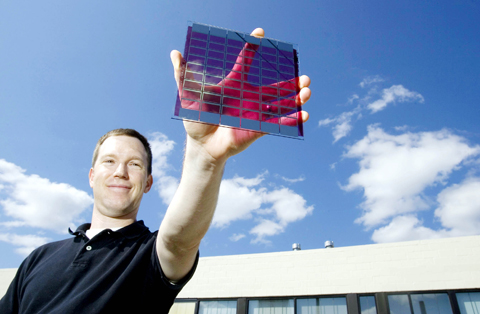The collapse of the US steel industry forced Drew Mihalek in 1977 to leave Pittsburgh, a onetime capital of industry that US President Barack Obama will show to world leaders this week as a “bold example” of a new green economy.
Mihalek, 58, recalls bubbling caldrons of metal during summer jobs at US Steel as a college student. Now he works in a dust-free workplace as an environmental health and safety manager at Solar Power Industries, a maker of solar cells.
Mihalek calls the change in his hometown “kind of like my own personal revitalization.” That shift will be in the spotlight this week as leaders from the G20 nations meet in various “green” buildings — a visible image of the new economy touted by the Obama administration.

PHOTO: REUTERS
Debate before the Pittsburgh summit of leading developed and developing countries has focused on bankers’ pay, regulation of the financial sector and how governments should withdraw from the enormous stimulus packages enacted to blunt the global economic crisis and spur growth.
Climate change and tackling high unemployment are other issues on the G20 agenda, tying into Obama’s vision for a green economy and why Pittsburgh is hosting the summit. But hopes for millions of new green jobs in the US economy may prove more ambitious than many advocates and investors dream of.
Central to a green economy are education, innovation and research, which Pittsburgh offers through schools like Carnegie Mellon University and the University of Pittsburgh. Also key are an educated work force and plentiful raw materials.
Andy Hannah, chief executive of Plextronics, a company that makes organic solar cells and organic light-emitting diodes and uses photoactive inks to print solar cells, said Pittsburgh offers the right mix of corporate and university talent.
Hannah also said Pittsburgh was a prime location for setting up Plextronics because raw materials such as aluminum, glass and plastics are produced locally.
Patrick McCarthy of ATRP Solutions, a polymer maker using technology developed at Carnegie Mellon, also said the key elements for a green company come together in Pittsburgh.
“In this city, we have a history of materials companies commercializing products. This expertise is not everywhere in the country,” McCarthy said.
Despite all its strides — Pittsburgh has one of the largest green collar work forces for a US city its size — some doubt green jobs will be a major engine for the economy.
Lester Lave, an economics professor and director of the Green Design Institute at Carnegie Mellon, said neither oil nor coal will be replaced any time soon. He also said politicians were overly optimistic in their assumptions about new jobs.
There has long been debate along left-right political lines about the viability of green energy and the large government funding needed to get renewable energy off the ground.
The US$787 billion economic stimulus package that Obama signed into law in February included more than US$60 billion in clean energy investments.
A green economy would boost energy independence and reduce a chronic US trade deficit, advocates say. But that dream is still far away: solar and wind power accounted for just 0.6 percent of US energy consumption last year, according to the US Energy Information Administration.
Another selling point for a green economy is that a green collar work force earns 10 percent to 20 percent more than other jobs, the Council of Economic Advisors has said. And those jobs are more likely to be union jobs, the council said.
The poster child for a green economy is solar power, which is expected to drive jobs growth, especially in installation.
But costs still outweigh benefits and industry experts say grid parity is a tipping point that is several years away. Grid parity refers to when solar costs come in line with the cost of electricity from the power grid.
Investors have made big bets on solar energy. There are about 45 publicly traded companies in the sector whose market capitalization is about US$50 billion.
A number of catalysts could spark a sudden conversion to solar panels, as was seen with the rapid adoption of cell phones in the late 1990s, said Shawn Kravetz, president of Esplanade Capital LLC in Boston, who has a fund dedicated to solar energy.
A tipping point could come earlier than many think, perhaps by 2011, especially if carbon taxes or a cap-and-trade program aimed at limiting carbon emissions comes about, Kravetz said. A fall in panel prices, cheap financing and the first solar panel to go up in a neighborhood are enough to spark sales, he said.
“People are more aware that solar isn’t a newfangled technology, it’s by-and-large a 30-year-old technology that works,” he said. “We just need to get the cost to where it’s cost effective, and where, thanks to some government support, we’re finally there.”

Taiwan last night blanked world No. 1 Japan 4-0 to win the World Baseball Softball Confederation’s (WBSC) Premier12 for the first time. Taiwanese ace Lin Yu-min (林昱珉) held defending champions Japan to just one hit and no runs in the first four innings, before catcher Lin Chia-cheng (林家正) opened the fifth inning with a solo home run. That was soon followed by a three-run homer from Taiwanese captain Chen Chieh-hsien (陳傑憲) to put Taiwan ahead in the prestigious tournament of the world’s top 12 baseball teams. In addition to a superb performance from 21-year-old Arizona Diamondbacks prospect Lin, three more Taiwanese pitchers

Taiwan Semiconductor Manufacturing Co (TSMC, 台積電), the world’s biggest contract chipmaker, yesterday held an equipment installation ceremony for its first 2-nanometer fab in Kaohsiung, six months ahead of schedule, Kaohsiung Mayor Chen Chi-mai (陳其邁) said. “To cope with the strong global demand for advanced chips, TSMC is to start moving in equipment for its first-ever 2-nanometer fab half a year earlier than scheduled,” Chen said at an question-and-answer session at the Kaohsiung City Council. TSMC’s 2-nanometer process technology would help accelerate the development of artificial intelligence (AI) applications as well as the transformation of local industries in Kaohsiung, Chen said in a

TEAM TAIWAN: While lawmakers proposed declaring Nov. 24 a national day, the CPBL commissioner urged the legislature to pass the budget for sports development Lawmakers yesterday proposed designating Nov. 24 as National Baseball Day and updating the design of the NT$500 bill to honor the national team’s victory in the World Baseball Softball Confederation’s Premier12 championship on Sunday, as thousands of fans came out to see the players parade down the streets of Taipei. Players, coaches and staff from the national team returned home on Monday night after achieving their best-ever performance in an international baseball tournament. After receiving a rapturous welcome at the airport, the players turned out yesterday for a street parade in front of thousands of adoring fans waving Taiwanese flags and

Taiwan moved clear of Mexico to be the only country at No. 2 in the World Baseball Softball Confederation (WBSC) Men’s Baseball World Rankings. Meanwhile, draft bills to set up a ministry of sports were approved at a joint session at the legislature in Taipei yesterday. After previously being tied with Mexico for second on 4,118 points, Taiwan moved clear on 5,498 points after they defeated Japan in the final of the WBSC Premier12 tournament on Sunday. Mexico (4,729) dropped to fourth, behind Venezuela (4,846), who finished fourth at the tournament. Taiwan narrowed the gap to first-placed Japan to 1,368 points from 1,638, WBSC